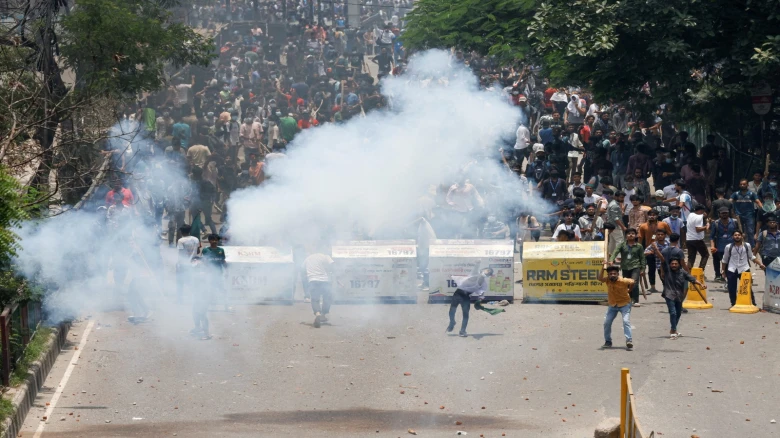As Bangladesh grapples with this crisis, the curfew and military presence underscore the government’s attempt to regain control...
Digital Desk: The Sheikh Hasina-led government in Bangladesh imposed a nationwide curfew late Friday, accompanied by the deployment of military forces to restore order after days of violent clashes over government job allocations. According to news agency AFP, the unrest has resulted in at least 105 fatalities and over 1,500 injuries across the country.
Obaidul Quader, the general secretary of the ruling Awami League party, announced the curfew, stating it was necessary to aid the civilian administration in maintaining order. This decision followed intense confrontations where police and security officials used bullets and tear gas to disperse protesters and banned all gatherings in the capital, Dhaka.
The protests, primarily driven by students, have spread across Dhaka and other cities. They oppose the current system of reservation in public sector jobs, which includes quotas for relatives of war heroes who fought for Bangladesh’s independence from Pakistan in 1971. The protesters argue that the system is discriminatory and primarily benefits supporters of Prime Minister Sheikh Hasina and her Awami League party, which led the independence movement. They demand a shift to a merit-based system.
Prime Minister Sheikh Hasina, however, defends the quota system, asserting that veterans deserve the highest respect for their contributions to the war, regardless of their political affiliations.
The situation escalated dramatically on Thursday when demonstrators set fire to the state broadcaster's building. In response, authorities shut down the metro rail and railway services to and from Dhaka. The government also ordered the shutdown of mobile internet networks in several parts of the country and closed schools and universities indefinitely.
On Friday, several Bangladesh newspapers experienced disruptions, with their websites failing to update and their social media presence inactive, as reported by Reuters. News television channels and the state broadcaster BTV went off the air, with some channels citing technical issues and promising to resume normal programming soon.
In a concerning development, the official websites of the central bank, the prime minister’s office, and the police appeared to have been hacked by a group calling itself “THE R3SISTANC3.” Messages on these sites read, “Operation HuntDown, Stop Killing Students,” and declared, “It’s not a protest anymore, it’s a war now.”
The unrest took a particularly violent turn when student protesters stormed a jail in the Narsingdi district, freeing hundreds of inmates and setting the facility on fire.
In the wake of the escalating violence, neighboring India refrained from commenting on the protests but confirmed that the approximately 15,000 Indian nationals in Bangladesh were safe. “We see this as an internal matter of Bangladesh,” stated external affairs ministry spokesperson Randhir Jaiswal.
The United States, known for its critical stance on Hasina’s government, condemned the violence. “We need to make sure that any kind of freedom of expression is happening safely and people are free from violence,” said State Department spokesman Vedant Patel, according to Bloomberg. “That’s something we’re continuing to pay close attention to.”
As Bangladesh grapples with this crisis, the curfew and military presence underscore the government’s attempt to regain control and prevent further loss of life. The coming days will be crucial in determining whether these measures can stabilize the situation or if the nation will face further turmoil.








Leave A Comment